Strength Through Joy:
An Interview with Béla Incze of Légió Hungária
Ondrej Mann
I met Béla Incze at the very intense sports camp of Légió Hungária (LH) in Hungary, as I previously wrote about. Béla is part of the group’s leadership. I was intrigued by his organization and its activities. I think a similar one could work in other European countries. Béla’s life story is also interesting, so I decided to interview him. We discussed sports, Hungarian politics, nationalist activities in Hungary, combat sports, the Hungarian youth, women, destroying a BLM statue, historical Hungary, holding demonstrations, and Viktor Orbán. I think we will hear more about him in the future.
Ondrej Mann: For how long have you been on the nationalist scene?
Béla Incze: Due to my upbringing, patriotism, or we can say a Right-wing way of thinking, has always been present in my life, but in 2004 I participated for the first time in an event that can be specifically linked to this milieu. In 2007 I joined a youth organization where I managed to gain a lot of experience in activism, event management, and basic legal skills, all of which are essential for this kind of fight. Then, in the 2010s, there was an academy in Hungary that had been set up by the Right’s intellectual elite. Its students were trained in the areas of philosophy, ideology, and national strategy. It wasn’t an accredited institution, but nevertheless, for many students what was said there became a lifelong compass, and I was one of them. With all these intellectual, theoretical, and practical experiences, in 2018 I decided with some others to launch Légió Hungária.
OM: Do you feel that something has changed over the years? For me, meeting other nationalists used to be a nightmare, but now it’s a pleasure to meet physically fit, intelligent people who know the history of their country and don’t behave in an anti-social manner.
BI: The reason why Légió Hungária was created was that we in Hungary were also experiencing more and more nightmare situations. Without going into the details, there was a need for a sort of “refreshing,” both ideologically and technically. Such work can never be said to be finished, because the task is to refine our own political community. But we take its success as a positive affirmation of the fact that many young people are turning to the far Right again.
OM: How did you manage to start LH? Can something similar be reproduced in other countries?
BI: At the time of our formation, our primary consideration was to have founding members who were well-known and respected on this scene and in their own fields. Most of these people came from various subcultures, but not exclusively. Since then, the number of members has increased significantly, but at the moment the proportions are similar to those we had in the beginning.
There is nothing that prevents the creation of similar organizations in other countries, they can even use the name Legion, but this is not our explicit aim. We aren’t making any effort in this direction. Our international relations are of course extensive, and in all cases we seek for the same worldview and mentality in our contacts.
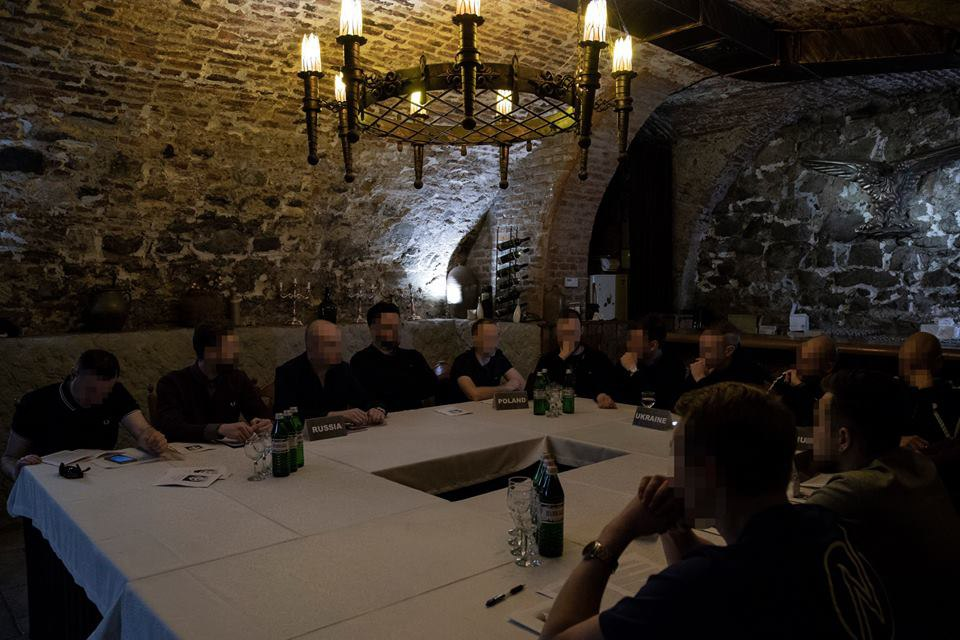
2019: Sword of Europe conference in Ungvár, Ukraine. The conference was held in a historically Hungarian castle.
OM: What do you think the youth in Hungary need most?
BI: It could end up being a long list of clichés in terms of what the youth need on a theoretical level, but since we don’t have an impact on all of society — in fact, not even on a wider social group — these would be utopian ideas. In the case of young people on the Hungarian far Right, however, a response is justified.
Above all, they have to be aware that one day they will shape this sphere, or perhaps wider frameworks will be available to them. These are the years that can lay the foundations for their intellectual, ideological, and technical background, and they can be physically prepared. In the eras we like to refer to, the intellectual elites and warriors of society were in many cases raised from birth to do their task. Unfortunately, we can’t do that, but we are preparing for possibilities that are far beyond where we are now. I think everything else is a matter of details. It all depends on human quality.
OM: There are generally few women in the White Nationalist movement. What would you recommend to young people? Find a partner within the movement and waste a lot of time and energy on it, or should one rather find a partner outside of nationalism? Or should one postpone his sex life and devote his energy to the movement? Can you manage a relationship if you devote so much time and energy to Légió Hungária?
BI: The reason that there are essentially few women in the nationalist movement is probably due to the fact that, despite of all its virtues, this scene is a subculture, and pretty much a masculine subculture. I have great appreciation for those ladies who find their true place with these circles, but let’s face it: the circumstances are not very favorable for them. We hope that this situation will change over time. In many cases, this subcultural nature is an advantage, because its obscurity provides protection, but it’s certainly an obstacle to influencing the larger society.
I would, however, suggest that everyone should choose a partner within the movement, or at least look for a partner who shares the same basic values. I’m lucky in that I found my partner very quickly in the community, and she is now my wife and the mother of my children. If she hadn’t come from this scene, she certainly wouldn’t understand why I do what I do. But I would go even further: it’s necessary for our chosen partner to be an activist, to a certain degree. The minimum is that we agree on the big questions of life. But if one half of the couple does not tolerate the other’s activist lifestyle, there will be a fatal conflict and the relationship will end — or else one of them will be forced to give up.
OM: Young people who are just beginning to find their way are interested in their future career, or else in how to start their own business. Is Légió Hungária leading young people in this direction? Does Légió Hungária encourage its members to study and to train for skilled work?
BI: Of course, we encourage our members to fulfill their potential, whether in their studies or in their work. In all respects it is true that the most useful people for the movement are those who prevail in all walks of life. This is often difficult, because if someone is discovered to be a member of Légió Hungária, they may face disadvantages, either at school or at work. One of our larger missions is to eradicate this phenomenon, because it would be a huge step towards reaching out to a wider audience if we could advertise the fact that there are not only lawyers, historians, teachers, and successful contractors, but also electricians, foresters, and university students among the legionaries. But the reality of today is that, to take just one example, I have lost the job I had as the Festung Budapest’s media organizer. This is the reality of Hungary at the moment, not the fairytale world that the Left-wing press is spreading about our country.
OM: Does Légió Hungária do any publishing? I saw some of your books in Hungarian, are they only for your members?
BI: No, our Movement does not function as a publisher. We only created our Black Book and the To the Battle Line! magazine for our members. The former contains writings on ideology, addressing questions regarding the practical aspects of our organization, while the latter’s contents are diverse, with book recommendations, sports, and many other topics.
We have good relations with several Right-wing publishers, and we help promote their publications and organize book presentations. Also, some of our members actively take part in these publications as writers, translators, or in other ways.
I would like to point out the Szabad Szellem–Magyar Kultúra Alapítványt (Free Spirit–Hungarian Culture Foundation) and the Varázsló Macska Kiadó (Magical Cat Publishing, a Right-wing book publishing project). We have a strong relationship with them.
OM: Légió Hungária is mainly focused on combat sports and weightlifting. Are you satisfied with this, or do you want to do more in the future?
BI: Before the Second World War, there was a famous slogan: “Sports is always a national defense!”
In the spirit of this slogan, we encourage our members to live a healthy, active life. The activities we most emphasize activities are true weightlifting and combat sports, but we also organize many hikes and have climbers in our ranks. It is not unusual for our members to participate in track races or the increasingly popular obstacle course races.
OM: What types of events does Légió Hungária organize? Sports, concerts, trips, visits to memorials, cooperation with other organizations?

You can buy Greg Johnson’s In Defense of Prejudice here
BI: Besides these events that you listed, we also organize demonstrations, although not in their classical form. In today’s Hungary it is unfortunately very hard to attract large numbers of people to a Right-wing demonstration. This has to do with the fact that many portray our government as being Right-wing, and because of this, they don’t feel like protesting. In contrast to this, the Left-wing forces, despite all of their problems, often organize demonstrations with several thousand participants. Before Viktor Orbán was reelected in 2010, it was exactly the opposite. For this reason, we only organize demonstrations with a small number of participants, but in the form of an action. The most memorable demonstration was in 2019, when we visited the well-known far-Left, Soros-funded club Aurora. We also successfully disrupted a pro-BLM demonstration, which was our most famous action, and which caught the international media’s attention. We then destroyed a BLM statue less than 24 hours after it was erected in Budapest. We likewise protest against the deviants marching in Budapest Pride every year.
We organize a lot of sports events annually. The biggest among these is the Nationalist Sports Camp, but this spring we will organize a Fight Night with the help of such experienced comrades as the French group Pride France and Kampf der Nibelungen from Germany.
Our hikes are usually memorial tours when we pay respects to our heroes who fell in major battles.
We can list many organizations that we cooperate with to hold various events. There are events that we organize together as partners, and sometimes we participate in each other’s events. I would like to highlight three of the ones we have a strong relationship with: the Betyársereg, Combat18Hungary, and Hungarian Hammerskins.
OM: What are you planning in the near future?
BI: The beginning of this year will be a tough one. In January we will organize a tour of several days where we will salute those Hungarian soldiers who went to the Soviet Union as occupying forces. Unfortunately they were stopped at the Don River by the Reds, and when the harsh winter arrived, 130,000 Hungarian soldiers either froze to death or were killed by the Bolshevik horde.
Our event that enjoys the most international interest will take place in February: the Day of Honour. Unfortunately this is a highly anticipated event not only for many of our Europeans comrades, but also for the authorities. Usually our German comrades are not even allowed to leave their country to attend this event. I hope that everybody feels the significance of this: They are denying citizens of the European Union their right to free movement throughout the bloc for political reasons. But, as if this wasn’t enough, they changed the law of assembly in Hungary in order to prohibit the Day of Honour. They created a new law exclusively against us. But despite all their efforts, we hold this event every year, one way or another. So we look forward to seeing every European nationalist in Budapest on February 11!
Also in February, we will send a larger delegation than ever before to the LukovMarsch in Sofia, Bulgaria, which will be held by our comrades from the Bulgarian National Union.
Then, in April, Hungary will host the European Fortress Alliance annual meeting. And in the first half of the year, the Fight Night that I previously mentioned will be held as well.
We also preparing for several other events throughout the rest of the year, but I would like to highlight that our movement is celebrating its fifth anniversary this summer. It will not be completely open to the public, but we will certainly celebrate the occasion in a more elaborate way than usual.
OM: Légió Hungária’s sports camp was quite demanding. Were the previous years’ just as difficult? I have heard the opinion that the activities were spread over more days, so the shortened weekend last time was more challenging.
BI: Based on the feedback we get from the participants, we manage to raise the bar every year. As an organizer, it’s more difficult to judge this, but considering the fact that we organized the first camp on a purely experimental basis and for only a few of our members, and now we are at the point where nationalists from three countries are attending it, we can say that the event is developing.
August 20 is a national holiday in Hungary. It is the date that the Hungarian sate was founded more than 1,100 years ago. In the previous years, the date had fallen in such a way that it resulted in a long weekend, but in 2022 it didn’t. Because of this, the sports camp had to be shortened by one day. This caused some challenges in terms of organizing, and the camp became much more intense, but I think that we managed to meet expectations. The programs were versatile, and we can say that the participants were maybe a bit more tired than pleasant . . .
OM: The camp was strictly alcohol-free. Are other Légió Hungária events like this? Does LH promote the NS Straight Edge (SXE) lifestyle?
BI: It is forbidden to consume alcohol at our sports events due to their nature, but this is also true of our street actions. Nevertheless, Légió Hungária is not an SXE organization. We have several members who have chosen this path, and I personally respect them for their determination and perseverance. However, everything has its place and time, including recreation.
OM: At the sports camp you talked about the upcoming Grand Challenge together with Ferenc. What is it about? Can you introduce the challenge to our readers? Are you planning to translate the Challenge into English?
BI: Just to be clear: It is part of the concept of nationalist sports that we organize ideological conversations in the evenings as well, and invite recognized nationalist athletes to roundtable discussions. Ferenc, a member of the previously-mentioned Betyársereg, is a well-known sportsman in Hungary who appears in the media as well. The challenge, as he explained, is not his event; it is loosely connected to the armed forces. It is a multi-day “extreme challenge” that mixes the training methods of elements of Spartan Race [a type of marathon-length obstacle course-Ed.] with those of elite military units. The challenge is open to the public, and as far as I know anyone can apply, but it is really extreme. Only a few of those who start it can complete it.
OM: Do you cooperate with Hungarians outside Hungary? Are there many nationalists among the Hungarians outside Hungary? What is your opinion of Hungarian irredentism and historical Hungary?
BI: Yes, we have contacts in all the areas of historical Hungary. We also have an independent division in Szeklerland [the Hungarian-majority part of Transylvania that is currently in Romania-Ed.]. The history of Europe is filled with bloodshed, and Hungary paid for its defeats with more than two-thirds of its territory and separation from millions of its citizens after both the First and Second World Wars. This has means that if we cross the border today in any direction, we will meet with Hungarians. In many cases they are living not as a diaspora, but in whole communities. Perhaps there is no need to say this, but it generates a lot of pathos and disagreements to this day. As Hungarian nationalists, the interests of Hungarians will always be primary for us. The Hungarian living space is where Hungarians live, and we will always at the very least stand up for our cultural autonomy, and in some cases, where the number of Hungarians allows it, we even consider the pursuit of territorial autonomy to be justified. This is not unique in Europe; just think of South Tyrol, where the rights of the various nationalities are protected by international conventions. So for us, this is not about irredentism, but a practice supported by effective European examples.

You can buy Greg Johnson’s Toward a New Nationalism here
It must be emphasized that we do not live in the past, however. Everyone in Europe has to understand that the first and second Vienna awards[1] are a celebration for a healthy-thinking Hungarian, and no one should expect us to think otherwise. But that era ended 80 years ago. We live in another world, with other realities, and many people in Hungary have to understand this. We are open to any organization in the Carpathian Basin that seriously adheres to anti-chauvinistic principles and proves it. That is why we have a great relationship with Carpathian Sich in Ukraine,[2] for example, and why there are irreconcilable differences between us and Noua Dreaptă in Romania.[3]
Previously, it was quite rare for a Hungarian organization to be involved with nationalist groups in those areas that were previously part of Hungary. When we broke with this practice, we received a lot of criticism for it, and when the Russo-Ukrainian War broke out, these criticisms became even stronger. But they only bounced off of us, because those who hold such views have only partial knowledge, and after we talk to them, they usually reevaluate their opinion, unless they are sick chauvinists. These latter types are those who lack even basic logic, as they seriously think that we as Hungarians are in contact with those who hate Hungarians. But such views have no importance.
The idea of a Europe of Nations and anti-chauvinism are great, but they are terribly fragile. Even if there were no background forces interested in fomenting unrest between nationalists, it would still be a very difficult job to settle these differences in Central Europe, and it only gets harder as we go further east on the continent. International diplomacy does not exist without mutual respect and compromise. We are ready for both, but only where we find honest reciprocation. We know that there are tensions even among the patriotic organizations within each nation, as we have experienced it ourselves, but anyone who takes these ideas seriously is ready to fight for them.
M: There are a lot of slogans circulating among White Nationalists, such as self-determination for every nation, no more brothers war, and so on. Do the Slovaks, the Kurds, the people of Kosovo, and the Russians in eastern Ukraine also have the right to their own identity and a right to self-determination?
BI: First of all, I would like to state that I am answering as part of the leadership of a Right-wing organization that is independent of all political parties. On one hand this makes it easier to answer, because it’s possible to offer unorthodox opinions on present-day international diplomacy without any particular consequences. But on the other hand it also makes it harder to answer, as Hungary’s political scene has not presented a unified front since the Second World War on such issues, which could be an alternative to the modern world’s conventional directives.
Specifically, in response to the question, I hold the position that every nation has a fundamental right to preserve and maintain its cultural identity. If I were to dispute this in the case of any nation, I would only differ slightly from those extreme Leftists whose slogan is “No borders, no nation.” But it must also be emphasized that nations have the right to protect their sovereignty against the possibility of separatism. To this it should be added that there is no general model that can be applied to all situations. In all cases, the particular circumstances should be examined.

2019: Radical Alliance demonstration in Ukraine, an anti-chauvinistic event involving Ukrainian, Russian, Czech, Serbian, Polish, and Hungarian movements.
OM: How do you perceive the politics of Viktor Orbán and his party, Fidesz?
BI: There are elements in our regional governmental politics that are worth recognizing, and it would be difficult to deny that Viktor Orbán has been the most talented politician in Hungary since 1989. However, I am not a fan when he misleads the extreme Right, because this causes people to be satisfied with partial results, and sometimes they end up as bigger Fidesz fans than the Fidesz members themselves. Our task is to fight against this Leftist government and offer criticisms from a Right-wing perspective, of course. We often refer to ourselves as militant conservative, and the most fundamental aspect of this worldview is that we do not compromise on spiritual and ideological issues. Those who accept the current system without criticism are making a serious and disproportionate compromise.

You can buy Jonathan Bowden’s Western Civilization Bites Back here.
To give you some practical examples of some problematic points, it must be emphasized that Fidesz has only worsened the relationship between gypsies and Hungarians, which was already not good. Billions of forints [the Hungarian national currency-Ed.] are going into support programs for them which bring no practical results, since the entire concept itself is fundamentally ineffective. They assume that if they can take the monkey out of the jungle, the jungle also be taken out of the monkey — but it is part of its nature.
As far as the West is concerned, Fidesz’s biggest propaganda trick has been the southern border fence. It is indeed there, but it ends where the Hungarian, Romanian, and Serbian borders meet, and whoever goes that way can have a very pleasant forest stroll into the Schengen Zone. Thus, the fence is not an impenetrable obstacle to those migrants who can think a little. Even if one of them gets caught, they are returned to the Serbian side and can try again the next day. Sooner or later, he will succeed.
A bigger problem is that the Orbán government developed a two-faced politic strategy during the years of peace. They looked to the West in the hope of getting European Union money, and eastward in the hope of getting cheap Russian energy, while at home it was presented as Hungary acting as a bridge between these two poles. The Russo-Ukrainian War dispelled these illusions. There has been no EU money, no cheap energy, and the imagined bridge collapsed. It has also been revealed that Hungary is a safe nest for FSB agents. While the countries of Central Europe have expelled dozens of Russian diplomats who were suspected agents, no suspicious persons were identified in Hungary. On the political Right there are those who think this is not a problem, but those who do not feel the gravity of this do not understand the importance of a country’s sovereignty, or its concept at all.
More subjects could be added, but if I start discussing the government’s deep Zionist commitment, I will have to go on at length.
OM: What about when you destroyed the Statue of Liberty. Is that case closed? How did it end?
BI: This should be explained for those who may not have heard about it. One of the local municipal governments in a Left-wing district of Budapest erected a Black Lives Matter statue that depicted the American Statue of Liberty in a kneeling position, in rainbow colors. The municipality and the sculptor both promised that if anyone damaged the statue, it could always be repaired. In reality, the statue did not end up standing for even a full day. I knocked it over and then surrendered to the police on the scene, taking responsibility for the action. The Leftists fully capitulated in their reactions, stating that they were shocked by the anger that had been directed against the statue, and thus did not restore it.
This topic initially seemed to unite the whole Hungarian Right, except for some pro-government journalists who were overcompensating. Everyone agreed that the statue should have been destroyed. Nevertheless, the legal procedure slowly continued in the background. In the first round, the case was raised to gang level, aimed at legionaries who were present at the time but who did not participate in the damaging of the statue. The police did this in order to be able to increase the level of punishment. After half a year, we received the judgment in utmost silence, and without trial: I was sentenced to public service and fines, and the others only to fines. Four of us received a total fine of more than half a million forints (approximately $1,500 USD—Ed.]. Of course, we then took the necessary legal steps and requested to receive a public trial in the case. That is where the story remains as of now.
This case also illustrates the system’s insincere nature. When the action took place, the government’s narrow circle celebrated the destruction of the statue. But then the system adopted the tactic of condemning us after remaining silent about it for a long time. This is an excellent example of what characterizes Hungary nowadays.
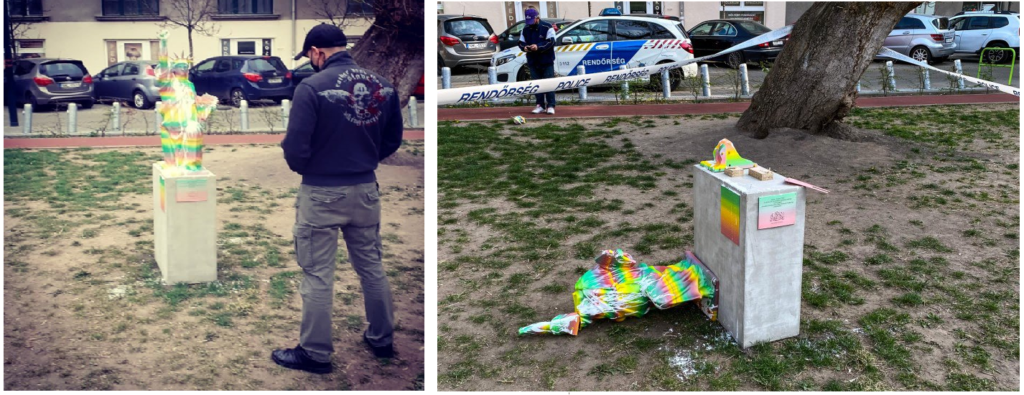
2021: The Budapest BLM statute, before and after. It was destroyed less than 24 hours after going up.
* * *
Like all journals of dissident ideas, Counter-Currents depends on the support of readers like you. Help us compete with the censors of the Left and the violent accelerationists of the Right with a donation today. (The easiest way to help is with an e-check donation. All you need is your checkbook.)
For other ways to donate, click here.
Notes
[1] These were two treaties negotiated by the Third Reich and Fascist Italy in 1938 and 1940, respectively, which saw parts of Czechoslovakia and Romania that had been taken from Hungary in the Treaty of Trianon after the First World War, and where large numbers of Hungarians were living, returned to it. These territories were again taken from Hungary after the Second World War, although the regions that were originally given to Czechoslovakia were given to Ukraine instead by Stalin, and remain there today.
[2] A Ukrainian radical nationalist organization.
[3] Noua Dreaptă, or “New Right,” is a Romanian radical nationalist organization that regards itself as the successor to Codreanu’s Iron Guard, and is strongly opposed to Hungarians and other minorities in Romania.
Strength%20Through%20Joy%3A%0AAn%20Interview%20with%20B%C3%A9la%20Incze%20of%20L%C3%A9gi%C3%B3%20Hung%C3%A1ria%0A
Share
Enjoyed this article?
Be the first to leave a tip in the jar!
Related
-
Race Recap
-
Stalin’s Affirmative Action Policy
-
The Worst Week Yet: March 31-April 6, 2024
-
Communist Barbarism in Hungary — and America Today: When Israel Is King
-
In Defense of Ethnonationalism
-
The Red Terror in Kiev: A Warning from a Century Ago, Part 2
-
Korean Capitalism and Prussian Socialism
-
The Red Terror in Kiev: A Warning from a Century Ago, Part 1
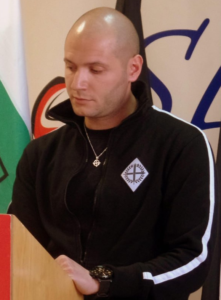


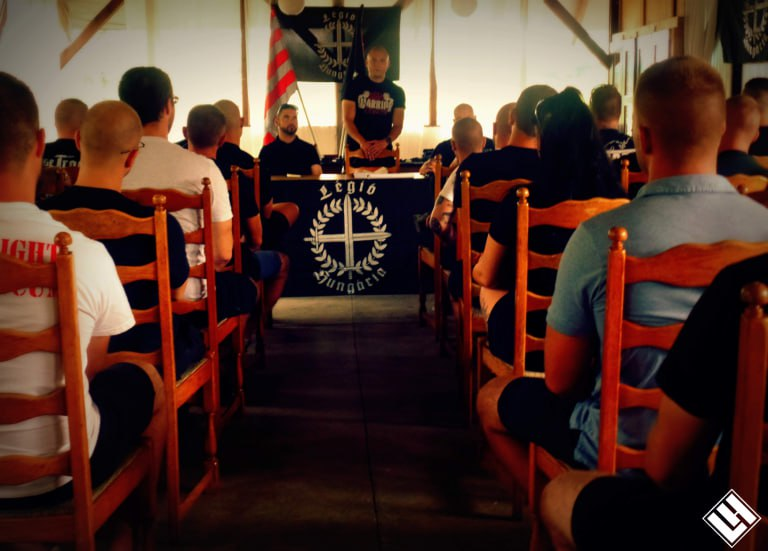
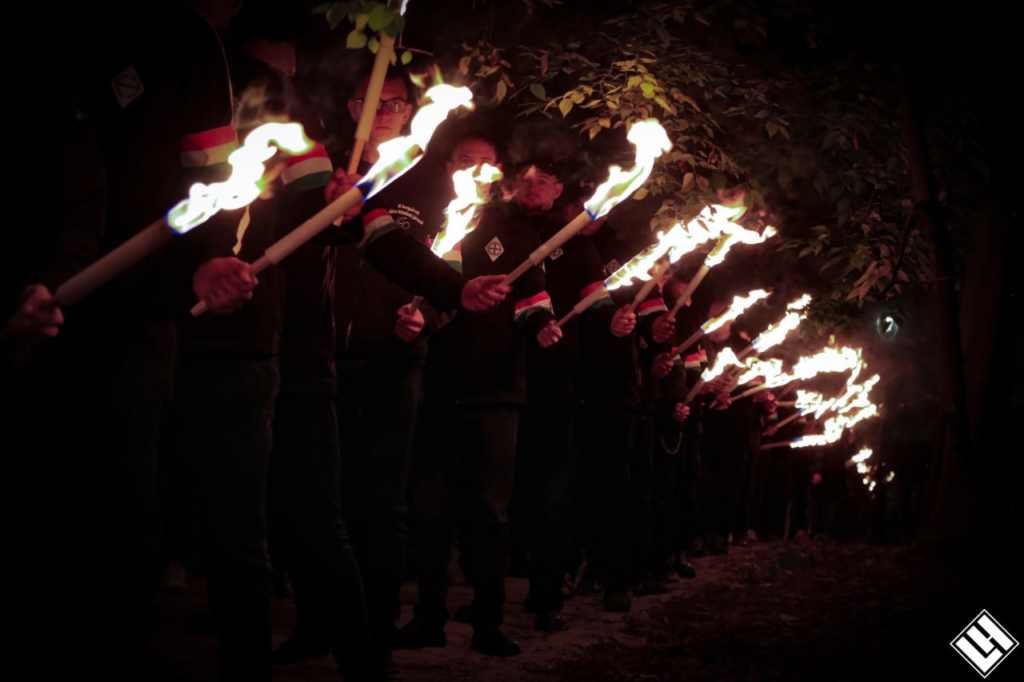
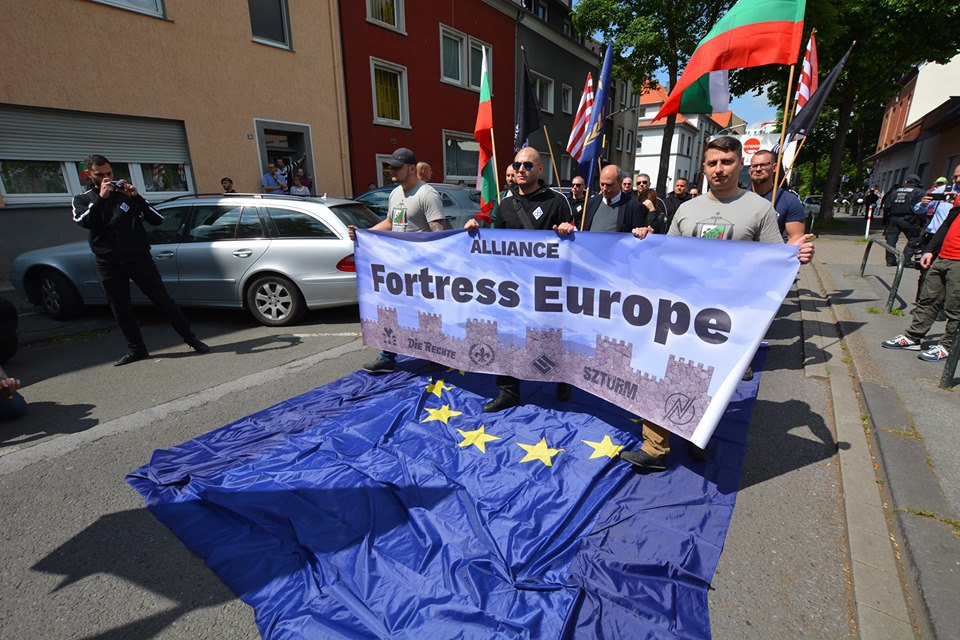

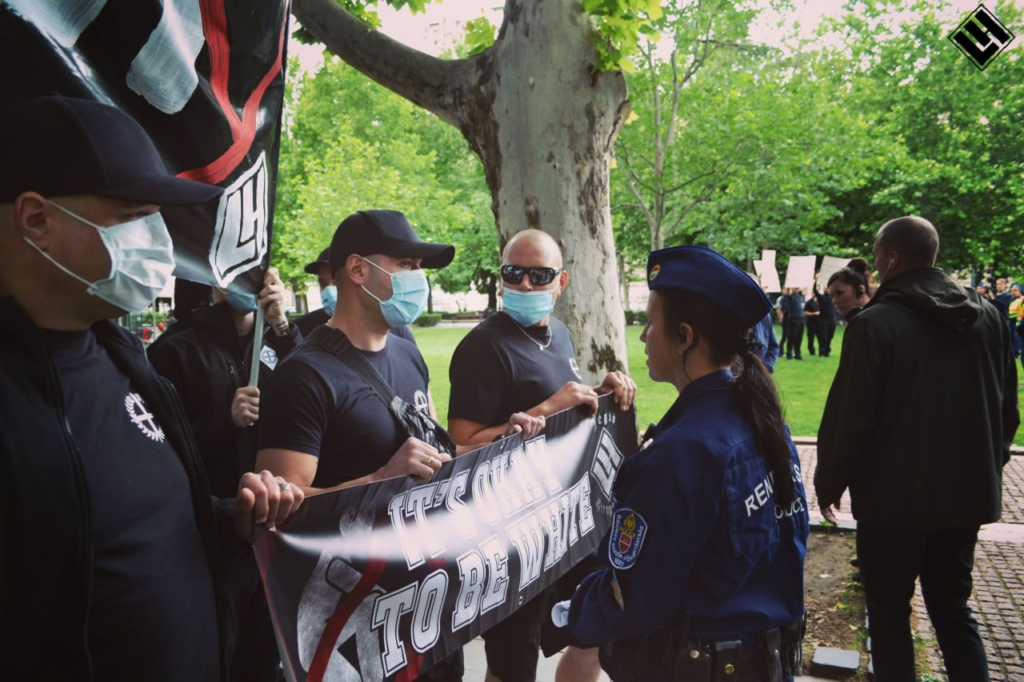
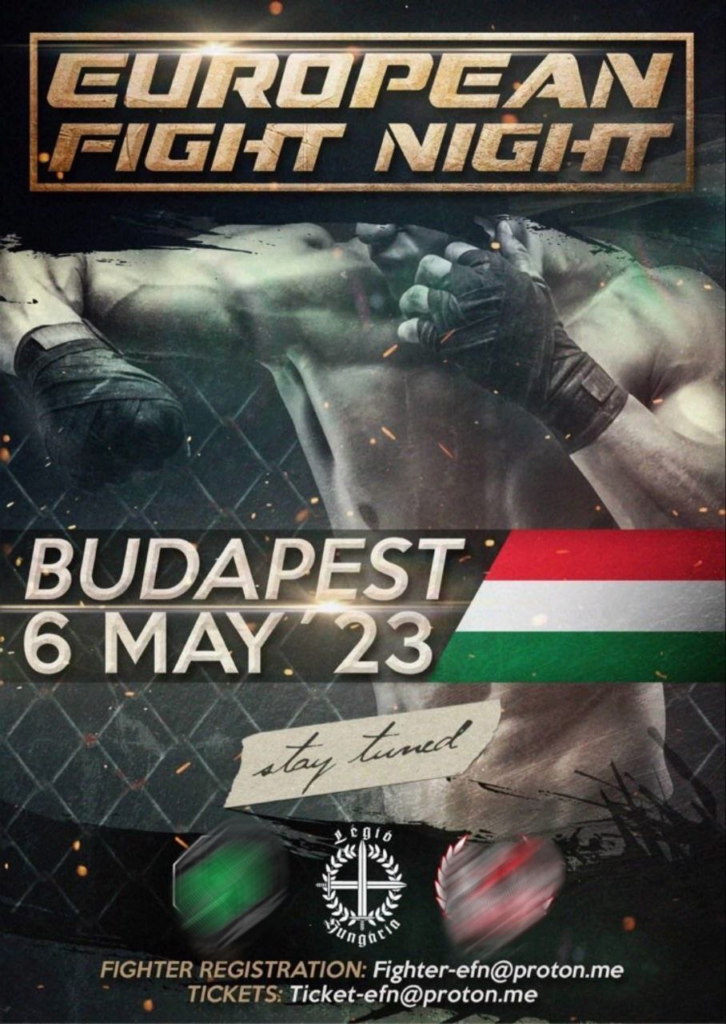

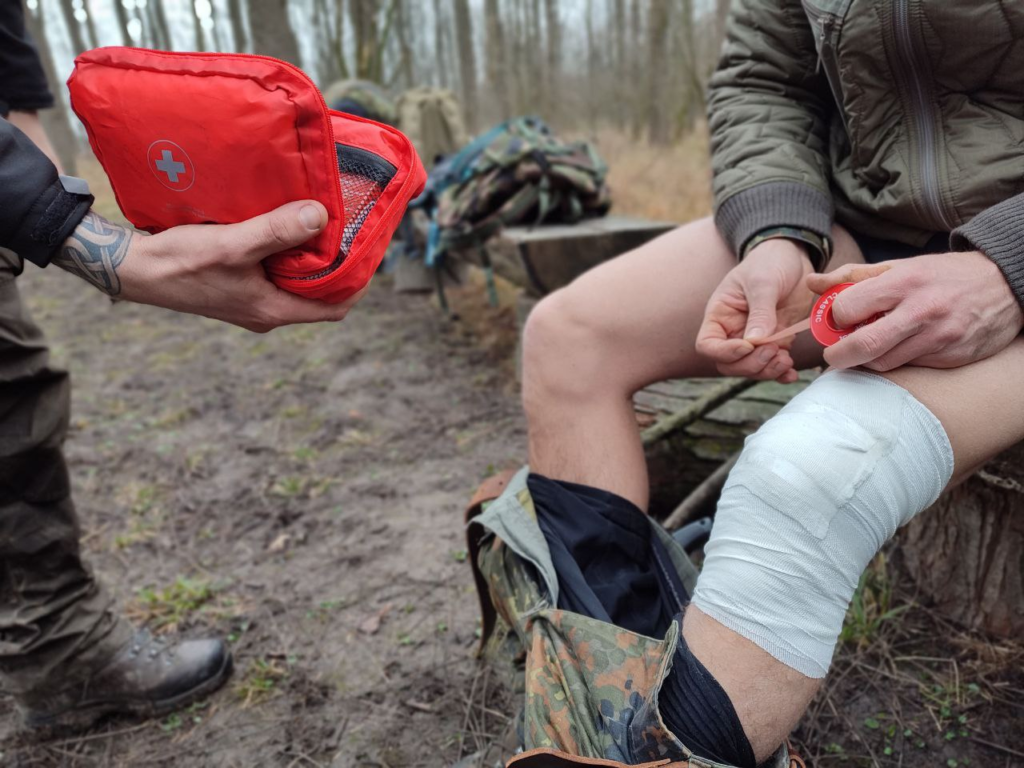


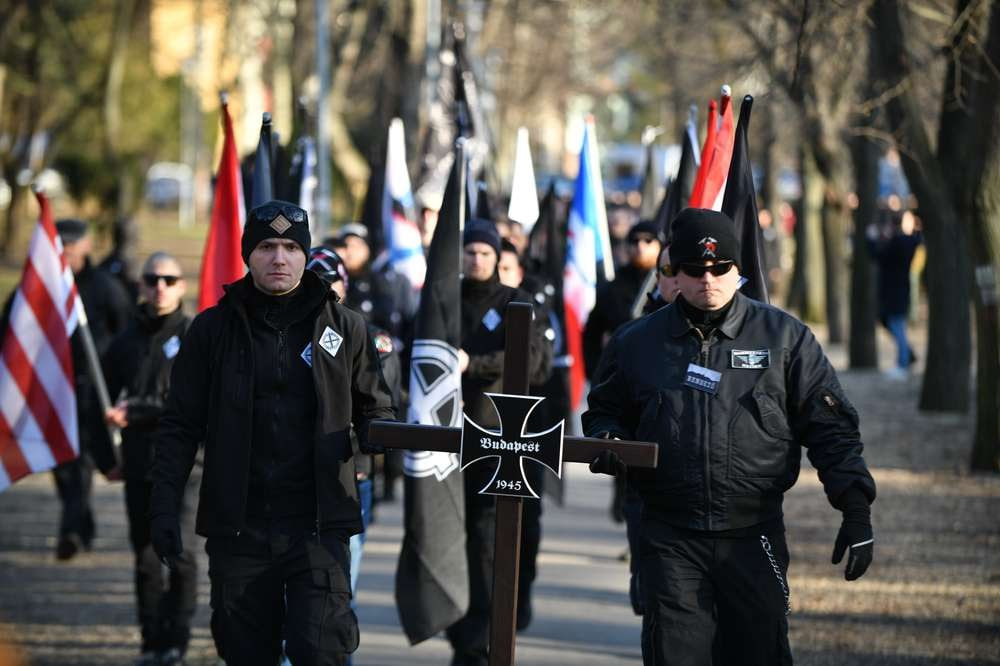
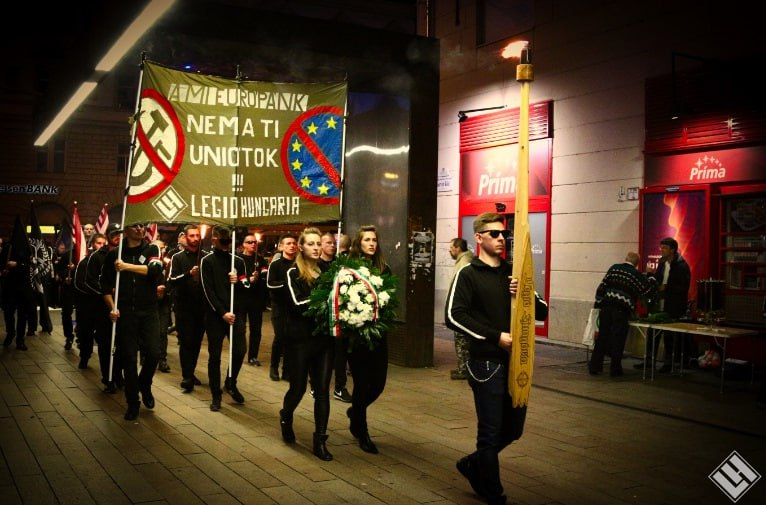
7 comments
Good recap on nationalist activism in Hungary. Lots of useful lessons. Let’s see more articles like this. And perhaps an interview.
I am preparing a similar lesson from Germany. It will be all about contemporary German nationalism. If you’re interested in Poland. Read my earlier interview with Jaroslaw Ostrogniew.
https://counter-currents.com/2020/12/interview-jaroslaw-ostrogniew/
“It has also been revealed that Hungary is a safe nest for FSB agents. While the countries of Central Europe have expelled dozens of Russian diplomats who were suspected agents, no suspicious persons were identified in Hungary.”
The only concrete evidence for this claim, repeated by Soros media ad nauseam, is a story about the son of a former Russian intelligence chief, who bought residency permit and a luxury apartment in Downtown Budapest, from a local businessman who is said to be an associate of Orbán’s much hated, über-effective spin master and election campaign czar Antal Rogán. The Russian hasn’t visited Budapest for many years, the apartment is empty. In 2022 Rogán was appointed minister in charge of supervising the Hungarian civilian intelligence services.
Frankly, it’s a big nothingburger. Budapest is what Zurich was in WWII. The city is traditionally teeming with all kinds of intelligence assets and political operatives, including Russians — as well as Americans who are currently busy working on Maidan-ing Orbán (and probably planning to use far right militants in a re-run of the previously successful Kyiv script).
As for the situation with diplomats, we almost never expel anyone. The last such incident was after the Skripal affair, when we sent home 1 guy from the Russian embassy, in solidarity with Britain. It’s a symbolic act, and sending home 1 is just as good a symbol as sending 51. The other party usually retaliates in kind — so Russia kicked out 1 Hungarian from Moscow. If we expell dozens, like the Czechs, Poles and others in the region did, that would just gut the embassy in Moscow. What’s the point.
Generally speaking, diplomats spy, and we are grown-ups.
Personally, I have also noticed this in Hungary. The Hungarian far right does not like Orbán because he has taken over their agenda. The media describe Orbán’s government as authoritarian, undemocratic, nationalist and far-right, but this is not true. As Béla writes, Orbán’s government is not managing the problems with the Gypsies, nationalists are being fired from their jobs for organising concerts, and in Budapest the authorities have made problems with the Day of Honour event (a historical commemoration of the defenders of Budapest against communism). The state apparatus and NGOs are still quite left-wing and multicultural. Personally, I hope that the nationalists will not try to overthrow the Orbán government, as they did on the Maidan in Kiev.
It happens in every regime, either rightist or leftist. No regime tolerates dissentment. It was common even under Franco’s rule in Spain, with far right militants getting jailed from police planted evidence
There is zero chance that the Hungarian far Right will try to overthrow the government. The far Right is critical of Orbán for the reasons Béla enumerated in your interview, but not to the point of attempting a revolution — that would be doomed to fail, anyway. They only way they could succeed would be to conspire with the US, as the Ukrainian nationalists did in 2014, but the radical Right here would never countenance that, nor would the people stand for it. There was, in fact, a US-backed “Hungarian Maidan” attempted in late 2014 that went nowhere. As one of my Hungarian friends put it at the time, “In Ukraine all the tough guys were on the globalist side. Here, they’re all on our side.”
The US has been using the Hungarian Left to try to subvert the Orbán government, but as the last election demonstrated, they don’t get much in return for their investment, because the Hungarian Left is totally incompetent.
Thanks for the comment. Where is the Hungarian far right heading? What does the Hungarian far right want? Please try to write it.
Comments are closed.
If you have Paywall access,
simply login first to see your comment auto-approved.
Note on comments privacy & moderation
Your email is never published nor shared.
Comments are moderated. If you don't see your comment, please be patient. If approved, it will appear here soon. Do not post your comment a second time.
Paywall Access
Lost your password?Edit your comment